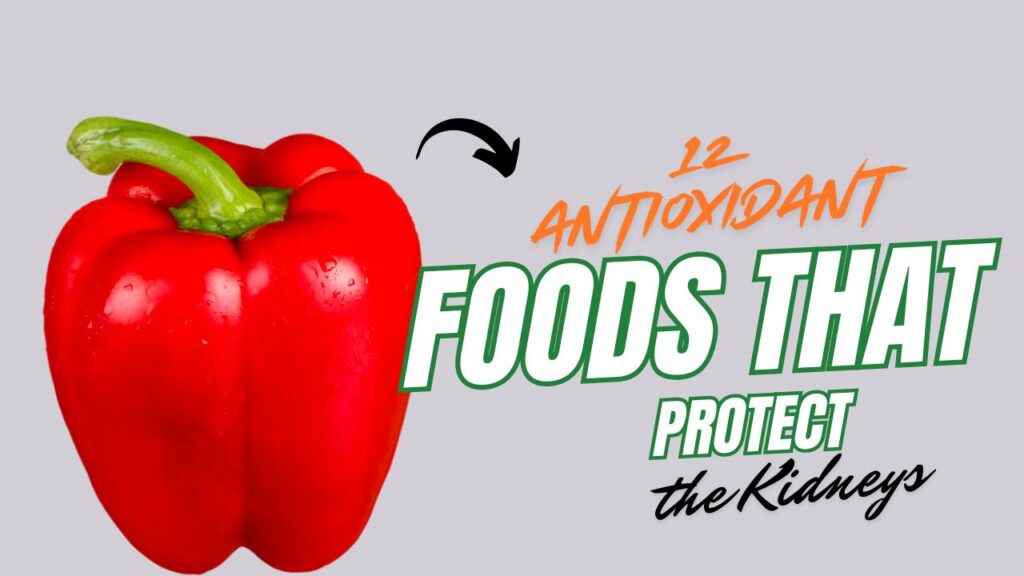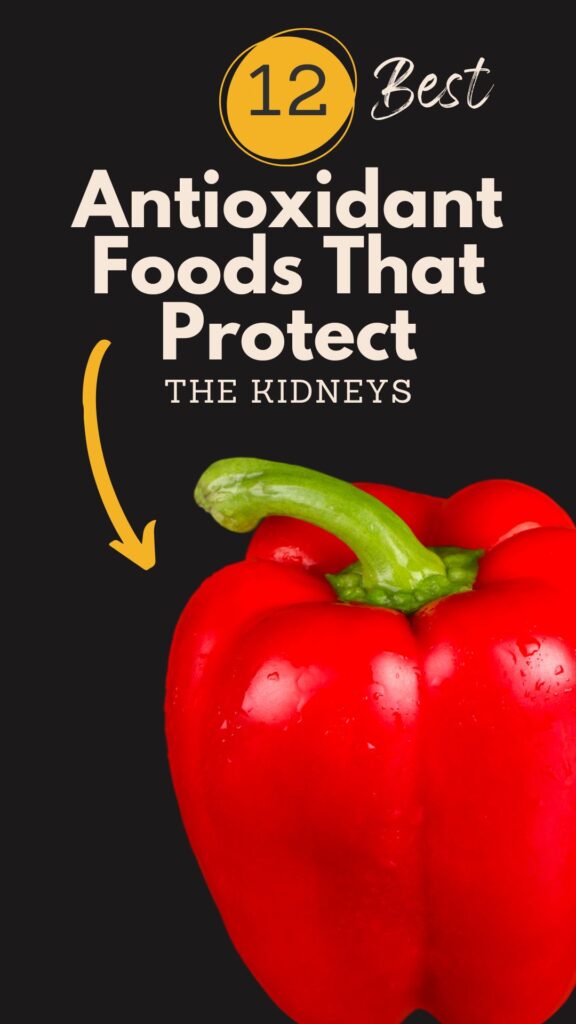Some links in this blog are affiliate links. If you make a purchase through these links, I may receive a small commission. This helps support the site at no extra cost to you.
Did you know that your kidneys filter nearly 50 gallons of blood every single day to remove waste and toxins from your body?
These two bean-shaped organs work tirelessly to balance fluids, regulate blood pressure, and even keep your bones strong. Yet, many people don’t realize how diet plays a powerful role in protecting them.
Antioxidant-rich foods are nature’s secret weapon against kidney damage. They fight oxidative stress—a major culprit behind chronic kidney disease (CKD), diabetes-related kidney issues, and even high blood pressure.
By including antioxidant foods in your meals, you can reduce inflammation, improve kidney filtration, and support long-term health.
In this post, we’ll uncover 12 of the best antioxidant foods that protect your kidneys. For each one, you’ll learn:
- How it supports kidney health
- The best ways to eat or use it
- Who should eat or avoid it
- Storage and buying tips
- Quick do’s and don’ts
- Possible side effects
Let’s dive into the foods your kidneys will thank you for!

Table of Contents

12 Antioxidant Foods To Support Kidney Health
1. Blueberries
Why They’re Good for Kidneys
Blueberries are packed with anthocyanins, powerful antioxidants that reduce inflammation and protect against oxidative stress. Studies suggest they may slow the progression of kidney damage in people with high blood pressure or diabetes.
Best Ways to Eat or Use It
- Add to oatmeal or yogurt bowls
- Blend into smoothies
- Snack on them fresh
- Use frozen berries for baking
Who Should Eat / Avoid
- Good for: diabetics (in moderation), weight-loss seekers, and athletes needing recovery.
- Avoid/Limit if: you’re on a very strict low-potassium diet for advanced CKD (consult your doctor).
Storage & Buying Tips
- Buy firm, plump berries with a deep color.
- Store in the fridge for up to a week.
- Wash just before eating to prevent mold.
Do’s & Don’ts
✅ Do: choose organic when possible.
❌ Don’t: leave them in airtight containers (moisture spoils them fast).
Possible Side Effects
Excessive intake may cause stomach upset for sensitive individuals.
2. Red Bell Peppers
Why They’re Good for Kidneys
Low in potassium yet high in vitamin C, vitamin A, and lycopene, red bell peppers are ideal for kidney-friendly diets. They also help reduce inflammation.
Best Ways to Eat or Use It
- Slice raw for salads
- Roast for a smoky flavor
- Add to stir-fries
- Blend into soups
Who Should Eat / Avoid
- Good for: people on low-potassium diets.
- Avoid/Limit if: allergic to nightshades.
Storage & Buying Tips
- Look for glossy, firm peppers.
- Store in the fridge crisper drawer.
Do’s & Don’ts
✅ Do: roast with olive oil for better antioxidant absorption.
❌ Don’t: store cut peppers uncovered (they lose moisture).
Possible Side Effects
Rare allergic reactions in some individuals.
3. Cranberries
Why They’re Good for Kidneys
Cranberries prevent bacteria from sticking to urinary tract walls, reducing the risk of infections that can harm kidneys. They are rich in polyphenols and vitamin C.
Best Ways to Eat or Use It
- Drink unsweetened cranberry juice
- Add dried cranberries to salads
- Use fresh cranberries in sauces
Who Should Eat / Avoid
- Good for: people prone to UTIs, women’s health.
- Avoid/Limit if: on blood-thinning medications (cranberries may interact).
Storage & Buying Tips
- Store fresh cranberries in the fridge up to 2 months.
- Freeze for longer shelf life.
Do’s & Don’ts
✅ Do: choose unsweetened products.
❌ Don’t: rely only on cranberry juice for UTI prevention—it’s supportive, not a cure.
Possible Side Effects
Too much cranberry juice may upset the stomach or increase kidney stone risk in some people.
4. Garlic
Why They’re Good for Kidneys
Garlic contains sulfur compounds and antioxidants that reduce kidney inflammation and lower cholesterol, blood pressure, and oxidative damage.
Best Ways to Eat or Use It
- Use raw in dressings or dips
- Roast for a sweeter taste
- Add minced garlic to sautés
Who Should Eat / Avoid
- Good for: heart patients, people managing high cholesterol.
- Avoid/Limit if: you’re on blood-thinning medication or scheduled for surgery.
Storage & Buying Tips
- Store bulbs in a cool, dark place.
- Avoid refrigeration (causes sprouting).
Do’s & Don’ts
✅ Do: crush garlic and let it rest 10 minutes before cooking (activates allicin).
❌ Don’t: overcook, as it reduces benefits.
Possible Side Effects
May cause bad breath or digestive irritation in sensitive people.
5. Red Grapes
Why They’re Good for Kidneys
Grapes are rich in resveratrol, an antioxidant linked to reduced kidney inflammation and protection against diabetes-related kidney issues.
Best Ways to Eat or Use It
- Enjoy fresh as a snack
- Add to fruit salads
- Freeze for a cooling treat
Who Should Eat / Avoid
- Good for: diabetics in moderation, heart patients.
- Avoid/Limit if: on medications that interact with grape compounds.
Storage & Buying Tips
- Choose firm grapes with green, flexible stems.
- Refrigerate unwashed grapes in a ventilated bag.
Do’s & Don’ts
✅ Do: eat with skin for maximum antioxidants.
❌ Don’t: buy shriveled grapes—they’ve lost nutrients.
Possible Side Effects
Overeating may raise blood sugar slightly.
6. Strawberries
Why They’re Good for Kidneys
Strawberries are loaded with vitamin C, manganese, and antioxidants that reduce inflammation and oxidative stress in kidney tissue.
Best Ways to Eat or Use It
- Add to cereals, smoothies, or salads
- Blend into sauces
- Eat fresh as dessert
Who Should Eat / Avoid
- Good for: weight loss, skin health, kidney support.
- Avoid/Limit if: allergic to strawberries.
Storage & Buying Tips
- Choose bright red berries with fresh green caps.
- Store in the fridge but wash only before eating.
Do’s & Don’ts
✅ Do: eat them raw for maximum vitamin C.
❌ Don’t: keep in airtight containers (they mold faster).
Possible Side Effects
May trigger allergies in sensitive individuals.
7. Spinach
Why They’re Good for Kidneys
Spinach is rich in flavonoids and vitamin C. While it has oxalates that may contribute to stones if eaten in excess, moderate amounts are beneficial for kidney protection.
Best Ways to Eat or Use It
- Use raw in salads or smoothies
- Lightly steam to preserve nutrients
- Add to soups and omelets
Who Should Eat / Avoid
- Good for: athletes, pregnant women (folate-rich).
- Avoid/Limit if: prone to kidney stones (oxalates).
Storage & Buying Tips
- Store fresh spinach in breathable bags.
- Wash thoroughly before use.
Do’s & Don’ts
✅ Do: pair with vitamin C foods to boost iron absorption.
❌ Don’t: overcook, as it destroys antioxidants.
Possible Side Effects
May worsen kidney stones if consumed in excess.
8. Apples
Why They’re Good for Kidneys
Apples contain quercetin, an antioxidant that lowers inflammation and helps reduce the risk of kidney disease. Their high fiber also supports blood sugar control.
Best Ways to Eat or Use It
- Eat raw with skin
- Add slices to salads
- Make apple sauce or smoothies
Who Should Eat / Avoid
- Good for: diabetics, weight management.
- Avoid/Limit if: allergic to apples.
Storage & Buying Tips
- Store in a cool, dry place or refrigerator.
- Choose firm, bruise-free apples.
Do’s & Don’ts
✅ Do: eat with skin for more antioxidants.
❌ Don’t: store near bananas (they ripen too quickly).
Possible Side Effects
May cause digestive discomfort in sensitive people.
9. Kale
Why They’re Good for Kidneys
Kale is a low-potassium, antioxidant-rich leafy green with vitamins A, C, and K. It supports detoxification and kidney protection.
Best Ways to Eat or Use It
- Blend into smoothies
- Bake into kale chips
- Add to soups and stir-fries
Who Should Eat / Avoid
- Good for: kidney patients needing low-potassium diets.
- Avoid/Limit if: on blood thinners (vitamin K interaction).
Storage & Buying Tips
- Choose firm, deep-green leaves.
- Refrigerate in a breathable bag.
Do’s & Don’ts
✅ Do: massage raw kale with lemon to soften.
❌ Don’t: leave unwashed kale damp—it spoils quickly.
Possible Side Effects
May interfere with thyroid function if eaten raw in excess.
10. Cherries
Why They’re Good for Kidneys
Cherries are packed with anthocyanins that reduce inflammation and uric acid levels, protecting against gout and kidney stress.
Best Ways to Eat or Use It
- Snack on fresh cherries
- Blend into smoothies
- Use tart cherry juice for recovery
Who Should Eat / Avoid
- Good for: gout patients, athletes.
- Avoid/Limit if: allergic to cherries.
Storage & Buying Tips
- Choose bright, glossy cherries.
- Refrigerate immediately.
Do’s & Don’ts
✅ Do: eat with skin for maximum benefits.
❌ Don’t: consume excessive cherry juice (sugar).
Possible Side Effects
May cause mild stomach upset if overeaten.
11. Green Tea
Why They’re Good for Kidneys
Green tea is rich in catechins, antioxidants that protect kidney tissue and improve blood filtration.
Best Ways to Eat or Use It
- Brew as hot tea
- Use chilled for iced tea
- Add matcha to smoothies
Who Should Eat / Avoid
- Good for: people managing blood sugar and weight.
- Avoid/Limit if: sensitive to caffeine.
Storage & Buying Tips
- Store tea in airtight containers away from light.
- Use fresh leaves for maximum benefits.
Do’s & Don’ts
✅ Do: drink without sugar.
❌ Don’t: drink too strong before bedtime.
Possible Side Effects
Excess caffeine may cause insomnia or rapid heartbeat.
12. Turmeric
Why They’re Good for Kidneys
Turmeric contains curcumin, a powerful anti-inflammatory and antioxidant compound that helps reduce kidney inflammation.
Best Ways to Eat or Use It
- Add to curries and soups
- Mix with warm milk (“golden milk”)
- Use in smoothies
Who Should Eat / Avoid
- Good for: people with chronic inflammation.
- Avoid/Limit if: on blood thinners or gallbladder issues.
Storage & Buying Tips
- Store turmeric powder in airtight jars.
- Fresh root should be kept in the fridge.
Do’s & Don’ts
✅ Do: combine with black pepper to enhance absorption.
❌ Don’t: overuse—it may cause stomach upset.
Possible Side Effects
High doses may upset digestion.
Conclusion
Your kidneys deserve as much care as your heart and brain. By adding antioxidant-rich foods like blueberries, cranberries, garlic, spinach, and turmeric to your meals, you can lower inflammation, protect against oxidative stress, and support kidney function naturally.
Remember, balance is key. Eating these foods in moderation, paired with a healthy lifestyle, can make a world of difference in how well your kidneys perform.
Try adding one or two of these foods to your diet this week and notice the difference. Which one will you start with? Share your favorite recipe or way to enjoy these kidney-protecting foods in the comments below!
Frequently Asked Questions (FAQs)
What are antioxidants, and why are they important for kidney health?
Antioxidants are compounds that fight oxidative stress, which can damage kidney cells. By reducing inflammation and free radical damage, they help slow kidney disease progression and support overall kidney function.
Can eating antioxidant foods reverse kidney damage?
No, antioxidant foods cannot reverse existing kidney damage, but they can help slow down further damage, protect kidney tissue, and improve overall health. They are best used as part of a healthy lifestyle.
Which antioxidant foods are lowest in potassium for kidney patients?
Red bell peppers, kale, apples, and blueberries are good antioxidant foods that are naturally low in potassium, making them safer for people with chronic kidney disease (CKD) on a low-potassium diet.
Can people with kidney disease eat spinach and turmeric?
Yes, but in moderation. Spinach is high in oxalates, which may contribute to kidney stones if consumed in excess. Turmeric should also be taken in moderate amounts, as too much may irritate the stomach or interact with medications. Always check with a doctor first.
How often should I eat antioxidant-rich foods for kidney protection?
Including at least one or two servings of antioxidant foods daily—such as berries, apples, or green tea—can support kidney function. The best approach is a balanced diet rather than focusing on just one food.
Are there any antioxidant foods that kidney patients should avoid?
Foods like bananas, oranges, and avocados are rich in antioxidants but also very high in potassium, which may not be suitable for advanced CKD patients. Always consult with a healthcare provider about dietary restrictions.
Is green tea safe for kidney patients?
Yes, green tea in moderation is safe and beneficial due to its catechins. However, excessive intake may increase caffeine-related side effects such as insomnia, dehydration, or increased heart rate.
Can cranberry juice really prevent kidney problems?
Cranberry juice can help reduce the risk of urinary tract infections (UTIs), which may protect the kidneys from infection-related damage. However, it should not be relied on as a cure or primary treatment.
Are fresh antioxidant foods better than supplements?
Yes, whole foods provide antioxidants along with fiber, vitamins, and minerals that supplements lack. Supplements should only be used if recommended by a healthcare professional.










